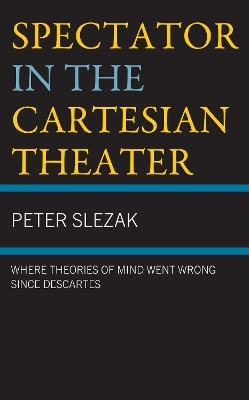
Spectator in the Cartesian Theater
Lexington Books/Fortress Academic (Verlag)
978-1-6669-2375-9 (ISBN)
Seemingly unrelated controversies about consciousness, language, and vision have a deep connection, a mistake that has not been noticed. Spectator in the Cartesian Theater: Where Theories of Mind Went Wrong since Descartes suggests that this error arises not from what is put into a theory but rather from what is missing. In Daniel Dennett’s famous metaphor of a “Cartesian Theater,” a homunculus or “little man” watches the screen on which our thoughts and sensations appear. Peter Slezak argues that we fail to notice that we are doing an essential part of the work of the theory and, therefore, we are the spectators in the Cartesian theory—like looking for our spectacles while wearing them. As philosopher Jerry Fodor pointed out, “The question is not what is obvious to the theorist; the question is what follows from the theory.”
This book argues that a proper understanding of the mistake reveals a deep connection among a range of seemingly unrelated problems at the forefront of controversy about consciousness, language, and vision, among others. In his physiological writings neglected by philosophers, Descartes explained how the pseudo-explanation arises, as Chomsky warns, by depending on “an intelligent and comprehending reader,” the central theme of the book.
Peter Slezak is honorary associate professor of philosophy at the University of New South Wales.
Introduction: Illusions
Chapter 1. Dangerous Meditations
Chapter 2. Illusionism and The Phenomenological Fallacy
Chapter 3. What It’s Like: Conscious Experience Itself
Chapter 4. Cogito, Ergo Sum: The Diagonal Deduction
Chapter 5. The Mind’s Eye: Visual Imagery
Chapter 6. In the Chinese Room: Life without meaning
Chapter 7. Meaning: Interpretation or Explanation?
Chapter 8. Proper Names: The Omniscient Observer
Chapter 9. The Theory of Ideas: Fodor’s Guilty Passions
Chapter 10. Descartes’ Neurocomputational Philosophy
Chapter 11. What is Knowledge? The Gettier Problem
Chapter 12. Disjunctivism: The Argument from Illusion (Again)
Chapter 13. Newcomb’s Problem: Demons, Deceivers, and Liars
Conclusion
| Erscheinungsdatum | 14.07.2023 |
|---|---|
| Sprache | englisch |
| Maße | 157 x 237 mm |
| Gewicht | 662 g |
| Themenwelt | Geisteswissenschaften ► Philosophie ► Sprachphilosophie |
| Geisteswissenschaften ► Psychologie ► Allgemeine Psychologie | |
| Geisteswissenschaften ► Psychologie ► Verhaltenstherapie | |
| ISBN-10 | 1-6669-2375-3 / 1666923753 |
| ISBN-13 | 978-1-6669-2375-9 / 9781666923759 |
| Zustand | Neuware |
| Informationen gemäß Produktsicherheitsverordnung (GPSR) | |
| Haben Sie eine Frage zum Produkt? |
aus dem Bereich


